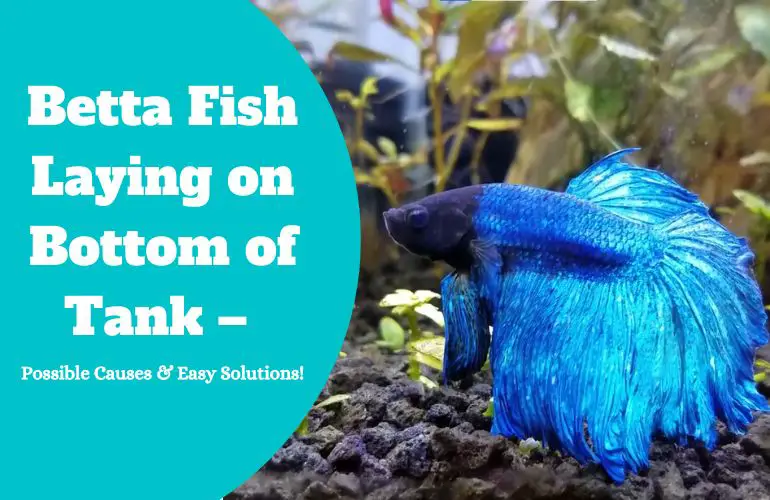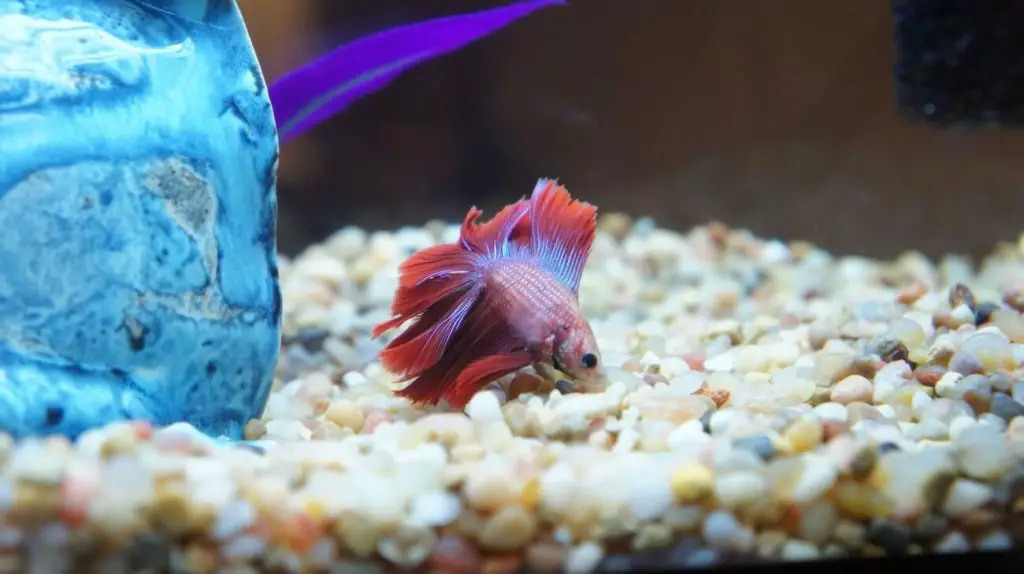Betta fish are known for their vibrant colors and majestic fins, but what do you do if you notice your betta fish laying on the bottom of the tank? There could be several reasons for this behavior, and it’s important to identify the cause to ensure the health and well-being of your aquatic pet.
In this article, we will explore the possible causes of betta fish laying on the bottom of the tank, such as water quality, temperature, and stress, and provide solutions to help your fish thrive. Whether you’re a seasoned betta fish owner or new to the hobby, understanding the reasons behind this behavior can prevent potential health issues and ensure your betta fish lives a long and happy life.
Betta fish laying on the bottom of the tank can be a sign of several issues. Possible causes include poor water quality, overfeeding, stress, and illness. To address the issue, start by testing the water conditions and ensuring they are within the appropriate range. Consider adjusting feeding habits and providing hiding spots for your fish to reduce stress. If the problem persists, consult a veterinarian or fish expert for further diagnosis and treatment.

**Betta Fish Laying on Bottom: Causes and Solutions**
Betta fish are one of the most popular aquarium fish around the world. These colorful fish are known for their vibrant colors and feisty personalities. However, if you notice your betta fish laying on the bottom of the tank, it can be a sign of a problem. In this article, we will discuss the causes and solutions for why your betta fish may be laying on the bottom of the tank.
**1. Poor Water Quality**
Poor water quality is one of the most common reasons why betta fish may be laying on the bottom of the tank. Betta fish are sensitive to changes in the water conditions, and poor water quality can lead to stress, illness, and lethargy.
To prevent poor water quality, it is essential to maintain the water conditions in the tank. Regular water changes, proper filtration, and monitoring the water parameters such as pH, ammonia, and nitrate levels are important.
**2. Overfeeding**
Overfeeding is another cause of betta fish laying on the bottom of the tank. Betta fish have small stomachs, and overfeeding can lead to constipation, bloating, and swim bladder issues. These issues can make it difficult for betta fish to swim and can cause them to lay on the bottom of the tank.
To prevent overfeeding, it is essential to feed your betta fish a balanced diet. The recommended amount of food per feeding is no more than what the fish can consume in two minutes.
**3. Stress**
Stress is a common cause of betta fish laying on the bottom of the tank. Betta fish are territorial and can become stressed when they feel threatened or when their environment changes.
To prevent stress, it is essential to provide your betta fish with a suitable environment. The tank should have plenty of hiding places, plants, and decorations to create a comfortable and safe space for the fish.
**4. Illness**
Illness is another cause of betta fish laying on the bottom of the tank. Betta fish are susceptible to a variety of diseases, such as fin rot, ich, and velvet. These diseases can cause lethargy, loss of appetite, and other symptoms that can cause the fish to lay on the bottom of the tank.
To prevent illness, it is essential to maintain proper water conditions and a clean environment. If you notice any signs of illness, such as white spots on the fish, fin damage, or lethargy, it is important to seek treatment immediately.
**5. Swim Bladder Disorder**
Swim bladder disorder is a common issue that can cause betta fish to lay on the bottom of the tank. This condition occurs when the swim bladder, which controls the fish’s buoyancy, becomes damaged or infected.
To prevent swim bladder disorder, it is essential to maintain proper water conditions and prevent overfeeding. If your betta fish is suffering from swim bladder disorder, it is important to seek treatment immediately.
**6. Parasites**
Parasites are another cause of betta fish laying on the bottom of the tank. These tiny organisms can infect the fish’s skin, fins, and internal organs, causing lethargy, loss of appetite, and other symptoms.
To prevent parasites, it is essential to maintain proper water conditions, clean the tank regularly, and avoid introducing new fish or plants without quarantine.
**7. Tank Size**
Tank size is another important factor that can cause betta fish to lay on the bottom of the tank. Betta fish require a minimum tank size of 5 gallons to thrive. A small tank can lead to stress, poor water quality, and other issues that can cause the fish to lay on the bottom of the tank.
To prevent this, it is important to provide your betta fish with a suitable tank size that meets their needs.
**8. Benefits of a Healthy Betta Fish**
A healthy betta fish is a happy and active fish. A betta fish that is in good health will be more energetic, eat well, and display vibrant colors. A healthy fish will also be less susceptible to disease and other health issues.
**9. Vs. an Unhealthy Betta Fish**
An unhealthy betta fish can display a variety of symptoms, such as lethargy, loss of appetite, and discolored or damaged fins. An unhealthy fish may also be more susceptible to disease and other health issues, which can shorten their lifespan.
**10. Conclusion**
In conclusion, if you notice your betta fish laying on the bottom of the tank, it is important to identify the cause and take action to prevent further issues. Maintaining proper water conditions, providing a suitable environment, and feeding a balanced diet are essential for a healthy betta fish. If you notice any signs of illness or other issues, it is important to seek treatment immediately to ensure the health and well-being of your betta fish.
Frequently Asked Questions
Betta fish are a popular pet, known for their vibrant colors and personality. However, it can be concerning when a betta fish is seen laying at the bottom of its tank. Here are some frequently asked questions and answers about this behavior.
What are the causes of a betta fish laying on the bottom?
There are several reasons why a betta fish may be laying on the bottom of its tank. One possibility is that the water conditions are poor, such as if the tank is too cold or too dirty. Another possibility is that the fish is experiencing stress, which can be caused by changes in its environment or aggression from other fish. Finally, the fish may be sick or injured, which can cause it to become lethargic and lay at the bottom of the tank.
If you notice your betta fish laying at the bottom of its tank, it is important to investigate the cause and take action to address it. This may involve testing the water quality, adjusting the temperature or filtration system, removing aggressive fish, or seeking veterinary care for a sick or injured fish.
How can I improve the water conditions in my betta fish’s tank?
Maintaining clean and healthy water is essential for the health and wellbeing of betta fish. To improve water conditions, start by performing regular water changes and cleaning the tank and filter. It is also important to monitor the temperature and pH level of the water, and to use appropriate water treatments or additives as needed. Additionally, avoid overfeeding the fish and remove any uneaten food promptly.
By taking these steps, you can help to ensure that your betta fish’s tank provides a safe and comfortable environment for them to thrive in.
How can I reduce stress for my betta fish?
Betta fish are sensitive to changes in their environment and can easily become stressed. To reduce stress, it is important to provide a stable and consistent environment for the fish. This may involve keeping the tank in a quiet location, avoiding sudden changes in lighting or temperature, and providing plenty of hiding places and decorations for the fish. Additionally, be sure to avoid overcrowding the tank, as this can lead to aggression and stress among the fish.
By reducing stress for your betta fish, you can help to promote their overall health and wellbeing and reduce the likelihood of them becoming lethargic or laying at the bottom of the tank.
What are some signs that my betta fish is sick or injured?
It is important to be able to recognize the signs of illness or injury in your betta fish. Some common symptoms include a loss of appetite, difficulty swimming, changes in color or appearance, and lethargy or laying at the bottom of the tank. Other signs may include inflammation or sores on the fish’s body, abnormal breathing or gasping for air, or excessive scratching or rubbing against objects in the tank.
If you notice any of these symptoms, it is important to seek veterinary care for your fish as soon as possible. Early intervention can be key to treating illnesses or injuries and promoting the health and wellbeing of your betta fish.
What can I do to promote the health and wellbeing of my betta fish?
There are several steps you can take to promote the health and wellbeing of your betta fish. These include maintaining clean and healthy water conditions, providing a stable and stress-free environment, feeding a balanced and appropriate diet, and monitoring the fish for signs of illness or injury. Additionally, it is important to research and understand the specific needs of your betta fish, such as their preferred water temperature and tank size, and to provide appropriate care accordingly.
By taking these steps, you can help to ensure that your betta fish lives a happy and healthy life and that you enjoy many years of companionship with your fish.

4 Reasons Why Betta Fish Lay At The Bottom Of The Tank
In conclusion, if you notice your betta fish laying on the bottom of their tank, it could be a sign of a variety of issues. It’s essential to monitor your betta fish’s behavior and environment for any potential problems.
One common cause of betta fish laying on the bottom is poor water quality. Make sure to regularly clean and maintain your fish’s tank to ensure a healthy living environment. Additionally, adding live plants and hiding spots can help reduce stress and create a more natural environment for your betta fish.
If poor water quality isn’t the issue, it’s essential to check for any signs of illness or disease. Keep an eye out for symptoms such as loss of appetite, lethargy, or discoloration, and consult with a veterinarian or experienced fish keeper if you notice anything concerning.
By understanding the causes and solutions for betta fish laying on the bottom, you can help ensure that your fish stays healthy and happy in their home. With proper care and attention, your betta fish can live a long and fulfilling life.
